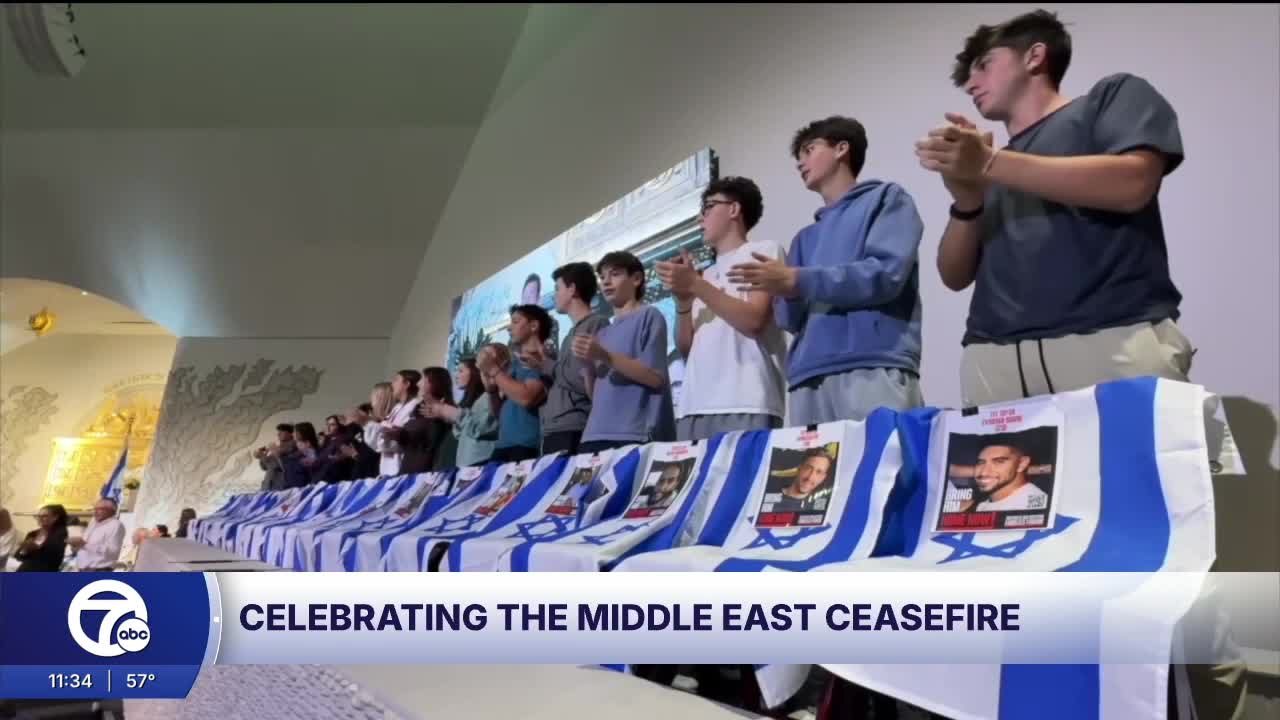WEST BLOOMFIELD, Mich. (WXYZ) — A historic ceasefire agreement between Israel and Hamas took effect Monday, bringing relief to communities across Michigan who have been deeply affected by the 15-month conflict.
The agreement means Israeli hostages are returning home after being held captive for more than two years, while the bombing has stopped in Gaza and nearly 2,000 Palestinian prisoners have been released.
Watch Evan Sery's video report below:
At Temple Israel in West Bloomfield, members and leaders gathered Monday night for a last-minute "Joy of Freedom" ceremony to celebrate what they called a moment two years in the making.
"This is what we have been praying for and looking for and hoping for the last two years," said Rabbi Marla Hornsten of Temple Israel.

For the past two years, the temple had reserved chairs in their sanctuary for hostages who were being held in captivity. With the ceasefire agreement bringing those hostages home, those symbolic chairs can finally be folded away.
"It is such a relief. We are so excited to bring the hostages home and take the chairs down," Hornsten said.

Rabbi Josh Bennett, also of Temple Israel, helped organize the ceremony and reflected on the significance of the moment.
"We've had chairs in our sanctuary that have been reserved for hostages who have sadly been held in captivity for the last two full years," Bennett said.

The relief is shared by Palestinian advocates in metro Detroit as well, though with different concerns about what comes next.
Lexis Zeidan, a Palestinian human rights activist from metro Detroit, was visiting family in Jordan when I spoke with her about the ceasefire.
"Because you don't have to wonder is a bomb gonna drop," Zeidan said, describing her sense of relief.

However, Zeidan expressed concerns about what safety and sovereignty will look like for Palestinians moving forward.
"Yes, there's a temporary pause in the bombing from the skies but what does the safety look like on the ground? What does the sovereignty look like on the ground? Are Palestinians still having to go through checkpoints?" Zeidan said.
Zeidan also highlighted what she sees as ongoing issues with how Palestinians are portrayed and treated.
"There's a consistent dehumanization of Palestinians in the headlines. I think there are a number of what they frame as political prisoners that I see as Palestinians also held as hostages, being detained, without any court hearings, being detained for staring a certain way or breathing a certain way," Zeidan said.
Related video: 'The war in Gaza is over': Trump hails deal to end Israel-Hamas conflict
During her time in Jordan, Zeidan said the ceasefire was a constant topic of conversation in restaurants and coffee shops, with many people questioning what the agreement actually means for the future.
"No matter what area I walked into, what restaurant I was in, what coffee shop I was in, you saw what was happening between the countries being broadcast live, and it was the same sentiment from most people, of, what does the ceasefire even mean," Zeidan said.
What the ceasefire looks like going forward remains to be seen, but religious leaders are hopeful for lasting peace.
"We are praying that the people of Israel, the people of Gaza, the people of the world can find a bit of wholeness as we move forward into the future," Bennett said.
—————
This story was reported on-air by a journalist and has been converted to this platform with the assistance of AI. Our editorial team verifies all reporting on all platforms for fairness and accuracy.












